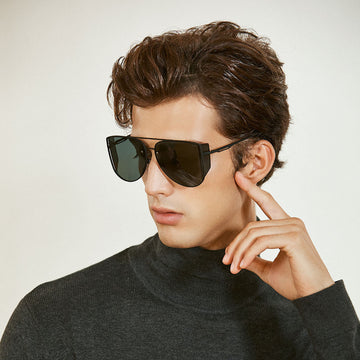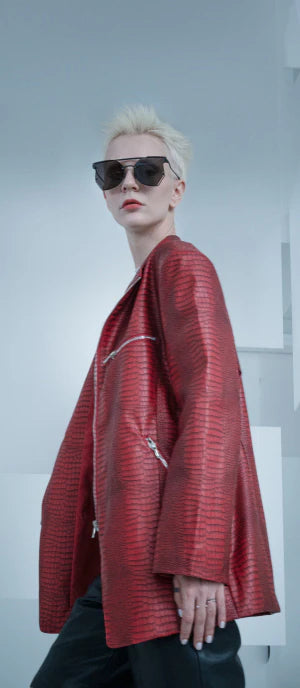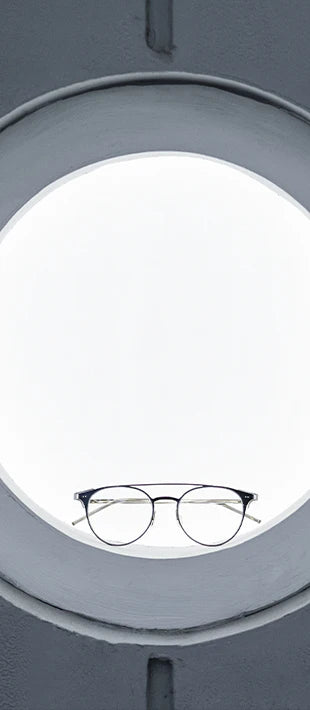Elegir entre lentes de contacto y gafas es una pregunta frecuente para quienes buscan corregir la visión. Con la avanzada tecnología actual en gafas y el auge de marcas premium como MythGreece, la decisión es más personal que nunca. Comprender las diferencias, tanto prácticas como económicas, puede ayudarle a elegir la solución visual que mejor se adapte a su estilo de vida. En esta guía, analizamos las diferencias entre lentes de contacto y gafas, comparamos sus ventajas y desventajas, y explicamos qué esperar en cuanto a las diferencias de precio y graduación entre lentes de contacto y gafas.
Los pros y contras de las gafas
Ventajas de las gafas
Las gafas graduadas siguen siendo una opción clásica por una razón: son prácticas, elegantes y de bajo mantenimiento. Con el auge de las monturas de moda de alta calidad, muchas personas las consideran tanto una herramienta visual como un accesorio de estilo. Las monturas modernas, como las que ofrece Myth Eyewear, utilizan materiales ligeros, puentes ergonómicos y recubrimientos avanzados para las lentes, lo que las hace más cómodas y duraderas que nunca.
Una de las mayores ventajas de las gafas es su simplicidad. Se ponen, se quitan, se limpian de vez en cuando, y listo. No tocan los ojos directamente, por lo que no hay riesgo de irritación por contacto. Además, ofrecen protección ocular adicional contra el viento, el polvo, los rayos UV y la luz azul , especialmente cuando están equipadas con recubrimientos avanzados.
Para quienes comparan la graduación de gafas con la de lentes de contacto, las gafas suelen ser más flexibles. Funcionan bien para todo tipo de errores refractivos, incluso con graduaciones altas, y no requieren la precisión de ajuste de los lentes de contacto.
Comprar gafas cuadradas y redondas - Corne
Desventajas de las gafas
A pesar de sus beneficios, las gafas también tienen inconvenientes. Algunas personas encuentran incómodas las monturas, especialmente si tienen un puente nasal bajo o piel sensible. Hoy en día, las gafas especializadas con puente nasal bajo están diseñadas para solucionar este problema, ofreciendo un ajuste más seguro y duradero para personas con puentes nasales bajos. Las gafas también pueden empañarse en ambientes fríos o húmedos, y pueden no ser ideales para deportes o entrenamientos intensos.
Otra limitación es la visión periférica. Dado que las gafas se colocan lejos de los ojos, los bordes de la visión pueden no ser tan nítidos como con las lentes de contacto. A algunas personas también les disgusta cómo las gafas cambian su apariencia o pueden sentir que ciertas actividades, como la fotografía o el baile, son más fáciles sin montura.
Comprar anteojos de aviador Κανε
Los pros y contras de los lentes de contacto
Ventajas de los lentes de contacto
Las lentes de contacto ofrecen una visión natural y sin obstrucciones, ya que se colocan directamente sobre el ojo. Siguen el movimiento ocular, manteniendo nítido todo el campo visual. Esto las hace especialmente atractivas para deportistas, viajeros y quienes prefieren un look minimalista y sin montura.
Si comparamos la prescripción de gafas con la de lentes de contacto, las lentes de contacto ofrecen una corrección más precisa porque se colocan directamente sobre la córnea. Muchas personas con astigmatismo ahora se benefician de las lentes tóricas, que proporcionan una visión estable y nítida durante todo el día.
Las lentes de contacto también son ideales si buscas total libertad en tu estilo. Puedes usar gafas de sol, incluso de alta costura como las de Myth Glasses , sin necesidad de lentes graduadas ni plantillas.
Desventajas de los lentes de contacto
Las lentes de contacto requieren mayor cuidado y disciplina. Es fundamental limpiarlas, reemplazarlas periódicamente y mantener una higiene adecuada para evitar infecciones. Las personas con ojos secos pueden encontrarlas incómodas, especialmente durante largas sesiones de computadora o en ambientes con aire acondicionado.
También pueden ser más caros con el tiempo. Al comparar el precio de las lentes de contacto con el de las gafas, estas suelen comprarse una sola vez, mientras que las lentes de contacto requieren gastos continuos: solución, estuches y repuestos regulares.
Y por último, los lentes de contacto no son ideales si frecuentemente sufres irritación ocular, alergias o dificultad para tocarte los ojos.

Lentes de contacto o gafas: ¿Cuál? ¡Ambas!
No hay ninguna regla que diga que debes elegir solo uno. Muchas personas usan tanto gafas como lentes de contacto, y cambian según su estado de ánimo, nivel de actividad o comodidad visual. Con la amplia variedad de diseños disponibles hoy en día, desde monturas ultraligeras hasta lentes de contacto desechables diarias, usar ambos puede ofrecerte lo mejor de ambos mundos.
¿Cuándo debes usar lentes de contacto?
Los lentes de contacto pueden ser la mejor opción cuando:
- Estás practicando algún deporte, corriendo o realizando actividades físicas.
- Quieres un campo de visión natural sin bordes de marco.
- Asistes a eventos en los que prefieres un look sin gafas.
- Quieres la libertad de usar gafas de sol de moda sin receta.
- Los lentes de contacto también son convenientes para viajar porque no tienes que preocuparte por romper los marcos.
¿Cuándo debes usar gafas?
Las gafas suelen ser mejores cuando:
- Tiene los ojos secos o irritados.
- Trabajas muchas horas en una computadora.
- Quieres un accesorio elegante para complementar tu atuendo.
- Estás en casa relajándote y prefieres algo que requiera poco mantenimiento.
Los anteojos también le dan a tus ojos un descanso de los lentes de contacto, lo que es especialmente importante si sufres de alergias estacionales o sequedad.
Comprar gafas redondas - Dusk
Preguntas frecuentes sobre lentes de contacto y gafas
¿Son las lentes de contacto más baratas que las gafas o más caras?
Al comparar el precio de las lentes de contacto con el de las gafas, las lentes de contacto suelen ser más caras a largo plazo. Debes reemplazarlas con regularidad y comprar un producto limpiador, mientras que las gafas, especialmente las de alta calidad como las Myth Eyewear , son una compra única que puede durar años con el cuidado adecuado.
¿Qué son mejores para usar la computadora: lentes de contacto o gafas?
Las gafas suelen ser más cómodas para el uso intensivo de la computadora, ya que ayudan a prevenir la sequedad y pueden incluir filtro de luz azul. Las lentes de contacto también pueden funcionar, pero la sequedad ocular puede empeorar frente a las pantallas.
Si tiene astigmatismo, ¿es mejor usar lentes de contacto o gafas?
Ambos funcionan bien. Las gafas ofrecen una corrección estable para todos los niveles de astigmatismo. Las lentes de contacto, especialmente las tóricas, son ideales para quienes desean una visión periférica nítida y flexibilidad para un estilo de vida activo.
¿La prescripción de sus lentes de contacto es la misma que la de sus gafas?
No. La prescripción de lentes de contacto y la de gafas son diferentes porque las lentes de contacto se colocan directamente sobre la córnea, mientras que las gafas se colocan a varios milímetros del ojo. Esta diferencia afecta la graduación de las lentes. Por eso, después de una adaptación correcta, se necesita una prescripción diferente para lentes de contacto y gafas.
¿Es mejor usar gafas o lentes de contacto?
Depende de tu estilo de vida. Muchas personas disfrutan de la comodidad de las gafas y la libertad visual de las lentes de contacto. En lugar de elegir lentes de contacto o gafas permanentemente, puedes alternar entre ellas según tu comodidad y actividad.
















